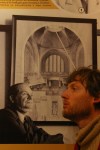The Camera Club Johannesburg (CCJ) hosts a curious competition they have dubbed “The Hubcap Rally.” I’m not entirely certain of the origin of the name. Perhaps the first one involved taking photos of wheels while travelling to one’s destination.
The origin of the name aside, the competition itself is a little tricky. In this day of digital photography, people aren’t too phased about pressing the shutter-release button 100 times to get that 1 half-decent image.
The Hubcap Rally gives you the finger on that approach, and says, “Take 24 photos, and submit the best 10 at the end of the day. No deleting any.”
That seems easy enough.
“Oh really? Perhaps I forgot to mention that each photo has to meet certain criteria. I’ll need one abstract, one close-up, a few external, a few internal, a landscape, some people, and so on. How you like me now?”
I still like you fine. I’ll just need to be a little more versatile in my approach. Look at the subject a little differently to how I usually do it. And hey, I’ve always got post-processing in photoshop.
“Nope. As it comes out of the camera is how you submit them.”
Dammit you’ve got a lot of rules. I’ll just have to be extra careful how I compose my shots, and make certain the camera settings are all right before I take the photo.
“One more thing. There is a theme. Your series of photos needs to stick to the theme. When the competition is judged, your ability to stick to the theme counts 50% towards your final score. The other 50% is the quality of the photos.
“Every year it’s different theme. This year I’ve chosen ‘The History of the Voortrekker’s and the Voortrekker Monument.‘”
You psycho.
As if there aren’t already ample photos of the Voortreker Monument out there.
Now there are more. I present my panel of photos. In some bizarre twist of fate, I actually won the competition (though by a very narrow margin). They say constraints stimulate creativity, and the Voortrekker Monument would have been a constraint for me by itself, even without the other limitations.










